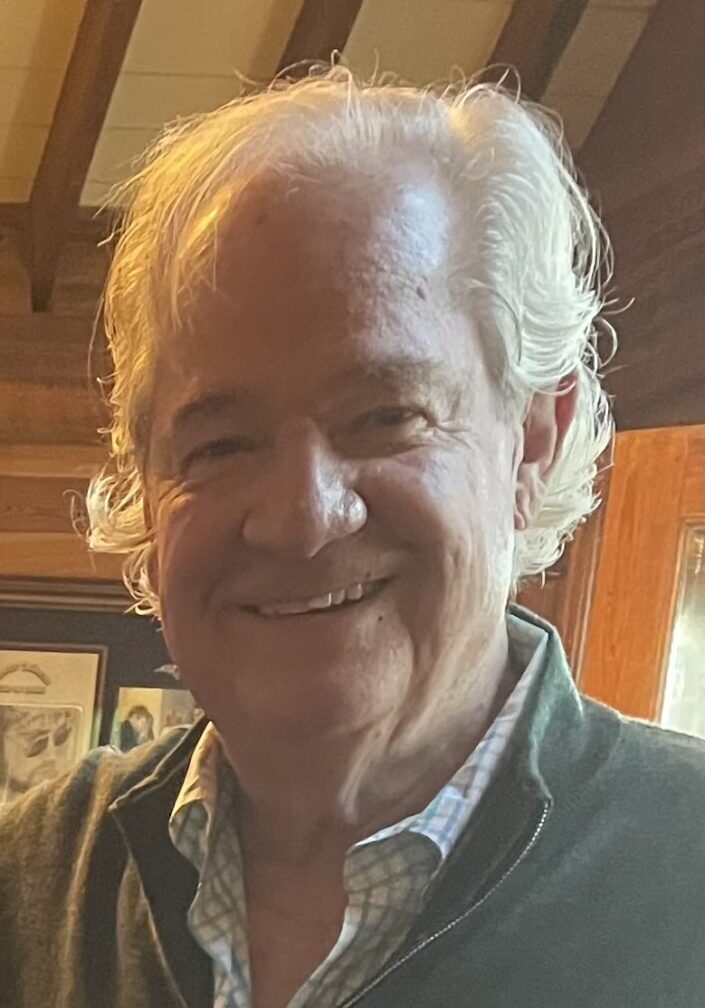Gary Pearce is a Democrat.
Carter Wrenn is a Republican.
They met when they negotiated the Helms-Hunt debates in 1984 — Gary representing Governor Hunt, Carter representing Senator Helms. They have directed eleven successful statewide campaigns for Governor, Senator and President.



Two political analysts find friendship in debate
Carter Wrenn and Gary Pearce met more than 30 years ago when they were working for opposing campaigns. Now, sitting in Wrenn’s oak-paneled Raleigh office, the colleagues joke with each other like brothers about their odd friendship. The remnants of many cigarettes smoked linger in the air of the office, which looks more like Wilson Library than a typical office.
Wrenn and Pearce first crossed paths while negotiating a debate between former Gov. James Hunt and Sen. Jesse Helms during the 1984 U.S. Senate race.
“There was absolute ice in that room. There was no trust anywhere in that room. We thought they were the devil incarnate,” Wrenn, the Republican, said of his first meetings with Pearce and Hunt’s campaign team.
The two teamed up years later on a nonpartisan effort to discourage Blue Cross Blue Shield of North Carolina from going for-profit and continued to face off while working for various political campaigns.
Fast forward 20 years to 2004, and Howard Dean was running for president.
“That was really the first campaign that had gotten into blogs and organized online,” Pearce said.
When they worked together on the Blue Cross Blue Shield initative, they traveled the state fundraising for the organization.
“We had a lot of quality time together in the car,” Pearce said. “It was then that I realized he was wrong about everything but he’s not really a bad guy.”
And so the idea of writing a blog together was born. Pearce credits Wrenn with the idea, but Wrenn seems hesitant to say that it was his idea, saying he hardly knew what a blog was at the time.
“I think people are just curious about politics,” Wrenn said. “So that’s what we set out to do — do a blog that takes people behind the curtain.”
Their site, Talking About Politics, is in its 10th year, and both publishers say they didn’t set out to provide an example of bipartisanship but rather strove to provide insight into the behind-the-scenes action of politics.
Wrenn got his start in politics, as he said most people at the time did, by not intending to stay in it. Meanwhile, Pearce was a reporter and editor for the News & Observer in Raleigh before joining his first political campaign.
Both Wrenn and Pearce say that almost everything about politics has changed since their early days coming up in the business.
“The debate has deteriorated a lot,” Wrenn said. “It is now just a rant and a finger point and a howl.”
Back in the day, he said, there were things you just didn’t do.
“There is a dimension of personal venom and pettiness. It always surprises me. It’s not ‘I think you’re wrong and here’s why.’ It becomes personal almost immediately,” Pearce said of today’s culture of debates, especially on the internet.
Pearce said he sees this antagonism almost every time he posts a blog. People get stirred up about something that he has written and spend copious amounts of time criticizing him.
“I wrote a piece yesterday about Randy Voller, criticizing him. I think my Facebook page exploded. Voller has put up three things attacking me,” Pearce laughs as he recalled the reactions to a recently written post.
“I’m a fast writer, and I tend to just throw something down and post it, and then I see someone agonizing over it and I think, ‘Well that’s pretty damn neat!’” Pearce said.
Most of the people who follow the blog are political junkies from both sides of the aisle and the press, but Pearce said the site holds the attention of several thousand readers.
“You’re putting information into the political world and people who are interested find it and it just stirs around,” Wrenn said.
Both Wrenn and Pearce watched Tuesday’s State of the Union given by President Barack Obama and thought he delivered a well-prepared speech. Though they disagree on the merits of Obama’s policy, they both say he has a real voice that has advanced his agenda and that of the Democratic Party.
“Possibly passed what his record proved him qualified for,” Pearce said.
Wrenn said the Republican Party still hasn’t found that once-in-a-generation voice to help define their message. He points to Ronald Reagan in the the 1970s and 1980s as the best example of someone giving a voice to the conservative movement.
“He gave voice to that movement. It created him politically, but he voiced it. That hasn’t happened for us again,” Wrenn said.
The two agree that in order for a candidate to be successful, they have to have a voice and public presence that voters respond to.
As political consultants, they say that they wouldn’t work for someone who they didn’t believe had the potential to have that kind of voice and charisma.
“You never know ‘til they get elected. You usually just look and ask if this is a good person,” Wrenn said.
The two have run races against each other in the past, but they have remained friends — and managed to learn to agree to disagree on almost every issue, except that money and message are the most important parts of running a campaign.
“We argue without hostility, and I think that is something that people find interesting,” Wrenn said. “There’s disagreement, but it’s polite.”
Though the two disagree on basically everything, as they are glad to point out to one another with a smile and a laugh, their blog and panel talks have made them an example of old-style debates that are often lost in the world of the internet.
Two political analysts find friendship in debate
Carter Wrenn and Gary Pearce met more than 30 years ago when they were working for opposing campaigns. Now, sitting in Wrenn’s oak-paneled Raleigh office, the colleagues joke with each other like brothers about their odd friendship. The remnants of many cigarettes smoked linger in the air of the office, which looks more like Wilson Library than a typical office.
Wrenn and Pearce first crossed paths while negotiating a debate between former Gov. James Hunt and Sen. Jesse Helms during the 1984 U.S. Senate race.
“There was absolute ice in that room. There was no trust anywhere in that room. We thought they were the devil incarnate,” Wrenn, the Republican, said of his first meetings with Pearce and Hunt’s campaign team.
The two teamed up years later on a nonpartisan effort to discourage Blue Cross Blue Shield of North Carolina from going for-profit and continued to face off while working for various political campaigns.
Fast forward 20 years to 2004, and Howard Dean was running for president.
“That was really the first campaign that had gotten into blogs and organized online,” Pearce said.
When they worked together on the Blue Cross Blue Shield initative, they traveled the state fundraising for the organization.
“We had a lot of quality time together in the car,” Pearce said. “It was then that I realized he was wrong about everything but he’s not really a bad guy.”
And so the idea of writing a blog together was born. Pearce credits Wrenn with the idea, but Wrenn seems hesitant to say that it was his idea, saying he hardly knew what a blog was at the time.
“I think people are just curious about politics,” Wrenn said. “So that’s what we set out to do — do a blog that takes people behind the curtain.”
Their site, Talking About Politics, is in its 10th year, and both publishers say they didn’t set out to provide an example of bipartisanship but rather strove to provide insight into the behind-the-scenes action of politics.
Wrenn got his start in politics, as he said most people at the time did, by not intending to stay in it. Meanwhile, Pearce was a reporter and editor for the News & Observer in Raleigh before joining his first political campaign.
Both Wrenn and Pearce say that almost everything about politics has changed since their early days coming up in the business.
“The debate has deteriorated a lot,” Wrenn said. “It is now just a rant and a finger point and a howl.”
Back in the day, he said, there were things you just didn’t do.
“There is a dimension of personal venom and pettiness. It always surprises me. It’s not ‘I think you’re wrong and here’s why.’ It becomes personal almost immediately,” Pearce said of today’s culture of debates, especially on the internet.
Pearce said he sees this antagonism almost every time he posts a blog. People get stirred up about something that he has written and spend copious amounts of time criticizing him.
“I wrote a piece yesterday about Randy Voller, criticizing him. I think my Facebook page exploded. Voller has put up three things attacking me,” Pearce laughs as he recalled the reactions to a recently written post.
“I’m a fast writer, and I tend to just throw something down and post it, and then I see someone agonizing over it and I think, ‘Well that’s pretty damn neat!’” Pearce said.
Most of the people who follow the blog are political junkies from both sides of the aisle and the press, but Pearce said the site holds the attention of several thousand readers.
“You’re putting information into the political world and people who are interested find it and it just stirs around,” Wrenn said.
Both Wrenn and Pearce watched Tuesday’s State of the Union given by President Barack Obama and thought he delivered a well-prepared speech. Though they disagree on the merits of Obama’s policy, they both say he has a real voice that has advanced his agenda and that of the Democratic Party.
“Possibly passed what his record proved him qualified for,” Pearce said.
Wrenn said the Republican Party still hasn’t found that once-in-a-generation voice to help define their message. He points to Ronald Reagan in the the 1970s and 1980s as the best example of someone giving a voice to the conservative movement.
“He gave voice to that movement. It created him politically, but he voiced it. That hasn’t happened for us again,” Wrenn said.
The two agree that in order for a candidate to be successful, they have to have a voice and public presence that voters respond to.
As political consultants, they say that they wouldn’t work for someone who they didn’t believe had the potential to have that kind of voice and charisma.
“You never know ‘til they get elected. You usually just look and ask if this is a good person,” Wrenn said.
The two have run races against each other in the past, but they have remained friends — and managed to learn to agree to disagree on almost every issue, except that money and message are the most important parts of running a campaign.
“We argue without hostility, and I think that is something that people find interesting,” Wrenn said. “There’s disagreement, but it’s polite.”
Though the two disagree on basically everything, as they are glad to point out to one another with a smile and a laugh, their blog and panel talks have made them an example of old-style debates that are often lost in the world of the internet.